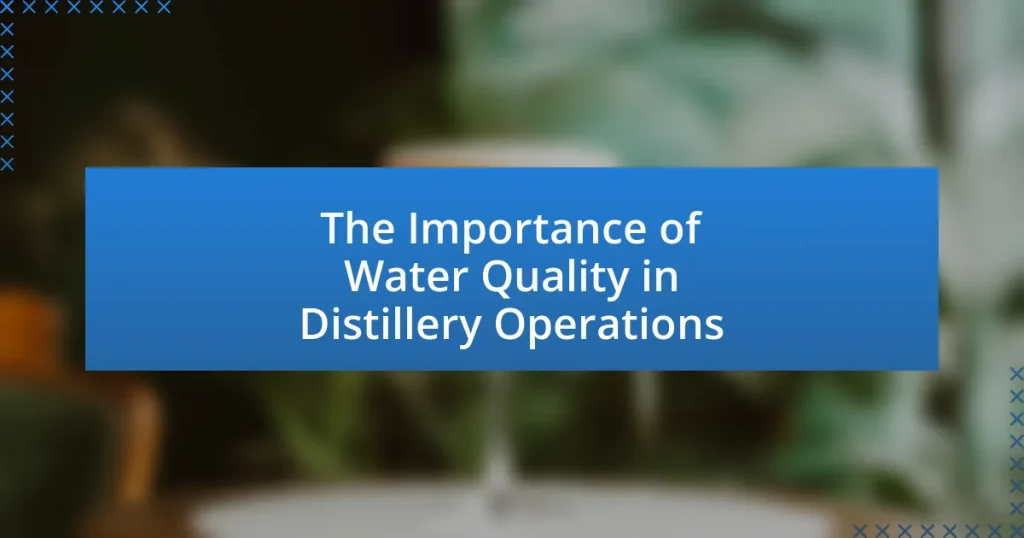Water quality is a critical factor in distillery operations, directly influencing the flavor, aroma, and overall quality of distilled spirits. High-quality water is essential for optimal fermentation and distillation processes, as impurities can lead to off-flavors and inconsistent product quality. Key components of water quality, such as pH, dissolved oxygen, and the presence of contaminants, significantly impact the final product. Distilleries must implement rigorous testing and treatment protocols to ensure water purity, utilizing methods like filtration and reverse osmosis to maintain high standards. Understanding the consequences of poor water quality, including health risks and operational inefficiencies, underscores the importance of effective water management in the distilling industry.

What is the Importance of Water Quality in Distillery Operations?
Water quality is crucial in distillery operations because it directly affects the flavor, aroma, and overall quality of the final product. High-quality water ensures that the fermentation and distillation processes occur optimally, leading to a more refined spirit. For instance, impurities in water can introduce off-flavors and hinder yeast performance, resulting in inconsistent product quality. Studies have shown that water with balanced mineral content enhances the extraction of flavors during mashing and fermentation, which is essential for producing high-quality spirits. Therefore, maintaining excellent water quality is fundamental for distilleries to achieve desired flavor profiles and ensure product consistency.
Why is water quality critical for distilleries?
Water quality is critical for distilleries because it directly affects the flavor, aroma, and overall quality of the distilled products. High-quality water ensures that the fermentation and distillation processes occur optimally, as impurities can lead to off-flavors and undesirable chemical reactions. For instance, water with high mineral content can alter the taste profile of spirits, while contaminants can introduce harmful substances. Studies have shown that distilleries using purified water report a more consistent and superior product, highlighting the essential role of water quality in achieving desired flavor characteristics and maintaining production standards.
What role does water play in the distillation process?
Water serves as a crucial component in the distillation process by acting as a solvent and a cooling medium. In distillation, water is often used to dissolve the substances being separated, allowing for efficient extraction of volatile compounds. Additionally, water is employed in the condenser to cool and condense vapor back into liquid form, facilitating the collection of distilled products. The quality of water directly impacts the purity and flavor profile of the final distilled product, as impurities in water can lead to undesirable flavors and aromas. Therefore, using high-quality water is essential for achieving optimal results in distillation.
How does water quality impact the final product?
Water quality significantly impacts the final product in distillery operations by influencing flavor, aroma, and overall quality. High-quality water, free from contaminants and with balanced mineral content, enhances the extraction of flavors during the fermentation and distillation processes. For instance, water with excessive chlorine or heavy metals can lead to off-flavors and undesirable aromas in the final spirit. Studies have shown that the mineral composition of water, such as calcium and magnesium levels, can affect yeast activity and fermentation efficiency, ultimately determining the character of the distilled product. Therefore, maintaining optimal water quality is crucial for producing high-quality spirits.
What are the key components of water quality?
The key components of water quality include pH, dissolved oxygen, turbidity, total dissolved solids (TDS), and the presence of contaminants such as heavy metals and microorganisms. pH affects the solubility and biological availability of nutrients and metals, while dissolved oxygen is crucial for aquatic life and influences chemical reactions. Turbidity indicates water clarity and can affect photosynthesis in aquatic plants. Total dissolved solids measure the concentration of dissolved substances, impacting taste and health. Contaminants like heavy metals and microorganisms can pose serious health risks, making their monitoring essential for safe water use in distillery operations.
What physical properties of water affect distillation?
The physical properties of water that affect distillation include boiling point, vapor pressure, and specific heat capacity. The boiling point of water, which is 100 degrees Celsius at standard atmospheric pressure, determines the temperature at which water transitions from liquid to vapor, directly influencing the efficiency of the distillation process. Vapor pressure, which is the pressure exerted by water vapor in equilibrium with its liquid, affects how readily water evaporates during distillation; higher vapor pressure facilitates faster evaporation. Specific heat capacity, the amount of heat required to raise the temperature of water, impacts the energy efficiency of heating water during distillation, as water with a higher specific heat capacity requires more energy to reach boiling point. These properties collectively determine the effectiveness and efficiency of the distillation process in distillery operations.
How do chemical properties influence the distillation process?
Chemical properties significantly influence the distillation process by determining the boiling points and vapor-liquid equilibrium of the substances involved. For instance, compounds with lower boiling points vaporize more readily, allowing for effective separation during distillation. The presence of impurities, such as salts or organic compounds, can alter the boiling point and affect the efficiency of the distillation process. Additionally, the polarity and molecular weight of the components influence their solubility and volatility, which are critical for achieving desired purity levels in the final product.
What are the consequences of poor water quality in distilleries?
Poor water quality in distilleries leads to significant negative impacts on product quality, operational efficiency, and safety. Contaminated water can introduce undesirable flavors and aromas into the final spirits, resulting in off-tasting products that fail to meet consumer expectations. Additionally, impurities such as heavy metals or microorganisms can compromise fermentation processes, leading to lower yields and inconsistent alcohol production.
Furthermore, poor water quality can cause equipment corrosion and scaling, increasing maintenance costs and downtime. For instance, a study by the American Distilling Institute highlights that water quality directly affects the distillation process, where impurities can alter boiling points and affect separation efficiency. Ultimately, these consequences can harm a distillery’s reputation and profitability.
How can contaminants affect the taste and aroma of spirits?
Contaminants can significantly alter the taste and aroma of spirits by introducing undesirable flavors and odors. For instance, impurities such as chlorine, sulfates, and heavy metals can impart off-flavors that mask the intended characteristics of the spirit. Research indicates that chlorine can create a medicinal taste, while high levels of sulfates can lead to a bitter flavor profile. Additionally, volatile organic compounds from contaminants can produce unpleasant aromas, detracting from the overall sensory experience. The quality of water used in distillation is crucial, as it directly influences the purity and flavor of the final product.
What are the potential health risks associated with poor water quality?
Poor water quality poses significant health risks, including gastrointestinal illnesses, reproductive problems, and neurological disorders. Contaminated water can harbor pathogens such as bacteria, viruses, and parasites, leading to diseases like cholera and dysentery. According to the World Health Organization, unsafe drinking water is responsible for approximately 485,000 diarrheal deaths each year. Additionally, chemical contaminants like heavy metals and pesticides can cause long-term health issues, including cancer and developmental delays in children. These risks underscore the critical need for maintaining high water quality standards, especially in industries like distilling, where water is a primary ingredient.

How can distilleries ensure high water quality?
Distilleries can ensure high water quality by implementing rigorous water sourcing, treatment, and testing protocols. They should select water sources that are free from contaminants and regularly monitor these sources for pollutants. Advanced filtration systems, such as reverse osmosis or activated carbon filters, can be employed to remove impurities. Additionally, distilleries must conduct frequent water quality tests to measure parameters like pH, hardness, and microbial content, ensuring compliance with industry standards. For instance, the American Distilling Institute recommends maintaining water quality to prevent off-flavors in spirits, highlighting the critical role of water in the distillation process.
What methods are used to test water quality?
Methods used to test water quality include physical, chemical, and biological assessments. Physical assessments involve measuring parameters such as temperature, turbidity, and color, which can indicate the presence of contaminants. Chemical assessments analyze substances like pH, dissolved oxygen, heavy metals, and nutrients, providing insight into the water’s chemical composition and potential pollutants. Biological assessments involve examining microbial populations and the presence of pathogens, which are critical for understanding water safety. These methods are validated by standards set by organizations such as the Environmental Protection Agency (EPA) and the World Health Organization (WHO), ensuring that water quality testing is reliable and effective for various applications, including distillery operations.
What parameters should be monitored regularly?
The parameters that should be monitored regularly in distillery operations include pH levels, dissolved oxygen, turbidity, total dissolved solids (TDS), and microbial content. Monitoring pH levels ensures that the water remains within the optimal range for fermentation, typically between 5.0 and 7.0, which is crucial for yeast activity. Dissolved oxygen levels must be kept low during fermentation to prevent unwanted aerobic bacteria growth, while turbidity indicates the clarity of water, affecting both aesthetic quality and potential contamination. Total dissolved solids (TDS) measurements help assess the mineral content of the water, which can influence flavor profiles. Lastly, regular checks for microbial content are essential to prevent spoilage and ensure product safety. These parameters are vital for maintaining high water quality, which directly impacts the quality of the final distilled product.
How can distilleries interpret water quality test results?
Distilleries can interpret water quality test results by analyzing specific parameters such as pH, mineral content, and microbial presence. These parameters directly affect the fermentation process and the final product’s flavor profile. For instance, a pH level between 6.5 and 7.5 is generally optimal for yeast activity, while high levels of calcium and magnesium can enhance the fermentation process. Additionally, testing for contaminants like E. coli or heavy metals is crucial, as their presence can compromise product safety and quality. By correlating these test results with historical data and production outcomes, distilleries can make informed decisions to adjust their water treatment processes, ensuring consistency and quality in their spirits.
What treatment options are available for improving water quality?
Treatment options for improving water quality include filtration, reverse osmosis, UV disinfection, and chemical treatment. Filtration removes particulates and impurities, enhancing clarity and taste. Reverse osmosis effectively eliminates dissolved solids, bacteria, and contaminants, ensuring high purity levels. UV disinfection uses ultraviolet light to kill microorganisms without chemicals, making it a safe option. Chemical treatment, such as chlorination or the use of coagulants, can address specific contaminants and improve overall water quality. These methods are widely recognized in the industry for their effectiveness in ensuring safe and high-quality water for distillery operations.
How does filtration improve water quality for distillation?
Filtration improves water quality for distillation by removing impurities and contaminants that can affect the purity and flavor of the distilled product. Effective filtration processes, such as activated carbon or reverse osmosis, eliminate particles, chlorine, and microorganisms, ensuring that the water used in distillation is clean and suitable for producing high-quality spirits. Studies have shown that using filtered water can enhance the overall taste and aroma of distilled beverages, as impurities can lead to off-flavors and undesirable characteristics in the final product.
What role does reverse osmosis play in water treatment?
Reverse osmosis plays a critical role in water treatment by effectively removing contaminants and impurities from water, ensuring high-quality water for various applications, including distillery operations. This process utilizes a semi-permeable membrane to separate water from dissolved solids, bacteria, and other pollutants, achieving a purification level that meets stringent quality standards. Studies have shown that reverse osmosis can remove up to 99% of total dissolved solids (TDS), making it an essential technology for producing clean water necessary for the fermentation and distillation processes in distilleries.

What best practices should distilleries follow regarding water quality?
Distilleries should implement rigorous water quality testing and treatment protocols to ensure the purity and consistency of their products. Regular testing for contaminants such as bacteria, heavy metals, and chemical residues is essential, as these can adversely affect flavor and safety. Additionally, distilleries should utilize filtration systems, such as activated carbon filters, to remove impurities and enhance water quality. The use of reverse osmosis can further refine water by eliminating dissolved solids, ensuring that the water used in production meets industry standards. According to the American Distilling Institute, maintaining high water quality is critical for achieving optimal fermentation and distillation processes, which directly influence the final spirit’s quality.
How can distilleries maintain consistent water quality?
Distilleries can maintain consistent water quality by implementing rigorous water sourcing, treatment, and monitoring processes. By selecting water from reliable sources, such as aquifers or springs known for their purity, distilleries ensure a stable baseline quality. Treatment methods, including filtration and reverse osmosis, can remove impurities and contaminants, further enhancing water quality. Regular monitoring of water parameters, such as pH, mineral content, and microbial levels, allows distilleries to detect and address any fluctuations promptly. Studies indicate that water quality directly influences the flavor profile of spirits, underscoring the necessity for stringent quality control measures in distillery operations.
What routine maintenance is necessary for water treatment systems?
Routine maintenance for water treatment systems includes regular inspection and cleaning of filters, monitoring chemical levels, and checking for leaks or malfunctions. These actions ensure optimal performance and compliance with safety standards. For instance, replacing or cleaning filters every 1 to 3 months prevents clogging and maintains water quality. Additionally, testing water quality parameters such as pH and turbidity weekly helps in identifying any deviations that could affect distillery operations. Regular maintenance not only extends the lifespan of the equipment but also ensures that the water used in distillation meets the necessary quality standards, which is crucial for producing high-quality spirits.
How can staff training improve water quality management?
Staff training can significantly improve water quality management by equipping employees with the necessary knowledge and skills to monitor and maintain water standards effectively. Trained staff can identify potential contaminants, understand regulatory requirements, and implement best practices for water treatment and usage. For instance, a study published in the Journal of Water Resources Management found that facilities with comprehensive training programs reported a 30% reduction in water quality violations. This demonstrates that informed staff can proactively address issues, ensuring compliance and enhancing overall water quality in distillery operations.
What are common troubleshooting tips for water quality issues?
Common troubleshooting tips for water quality issues include testing water regularly for contaminants, adjusting pH levels, and ensuring proper filtration. Regular testing helps identify specific contaminants such as chlorine, heavy metals, or bacteria, which can affect the quality of distilled products. Adjusting pH levels is crucial because water that is too acidic or alkaline can alter the taste and quality of the final product. Proper filtration systems, such as activated carbon filters or reverse osmosis, can effectively remove impurities, ensuring that the water meets the required standards for distillation. These practices are essential for maintaining high water quality, which directly impacts the overall quality of distilled beverages.
How can distilleries identify and resolve water quality problems quickly?
Distilleries can identify and resolve water quality problems quickly by implementing real-time water quality monitoring systems that analyze parameters such as pH, turbidity, and microbial content. These systems enable immediate detection of anomalies, allowing distilleries to take corrective actions swiftly. For instance, a study published in the Journal of Water Supply Research and Technology demonstrated that continuous monitoring can reduce response time to water quality issues by up to 50%, ensuring that production processes remain efficient and compliant with safety standards.
What resources are available for distilleries facing water quality challenges?
Distilleries facing water quality challenges can access several resources, including water treatment technologies, regulatory guidelines, and industry associations. Water treatment technologies such as reverse osmosis and activated carbon filtration can effectively remove contaminants, ensuring compliance with safety standards. Regulatory guidelines from organizations like the Environmental Protection Agency provide frameworks for monitoring and improving water quality. Additionally, industry associations, such as the Distilled Spirits Council, offer support and resources for best practices in water management. These resources collectively help distilleries maintain high water quality, which is crucial for product integrity and operational efficiency.


